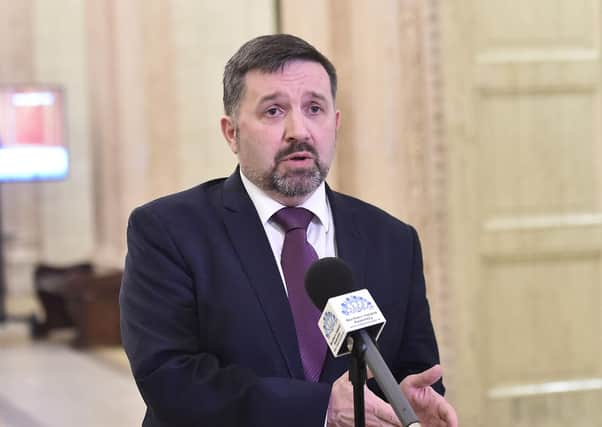Coronavirus: Robin Swann explains why so few people being tested, and disavows herd immunity approach to COVID-19


Speaking in the assembly on Monday, he said they are examining the possibility of bringing recently retired health professionals back in to service to cope with the expected strain and also using professionals who may be just about the qualify. This will apply to all primary care professionals and domiciliary carers.
“We will very soon be reaching out and asking for anyone who can help to please help, should that be in the voluntary and community sector, should it be in the sport sector, should it be in our faith based organisations,” the minister said.
Advertisement
Hide AdAdvertisement
Hide Ad“Because as we move further into the social shielding of our older population we will become reliant on general and civic society to support those individuals while we go through this phase, which will be very challenging for many.”
Quizzed about the extent to which people suspected of having the virus are being tested, he said that the limited resources in laboratories mean that they had to prioritise testing for patients in critical conditions, patients who require hospital admissions with severe symptoms, people who come from places where they are clusters of infection, and front line care workers.
He thanked those people who self-isolated with apparent symptoms, noting they were helping the rest of the community, but said it would not be feasible to test them all.
Anyone whose symptoms become severe should not attend their GP or hospital but instead phone their GP or hospital, he added.
Advertisement
Hide AdAdvertisement
Hide AdIn response to the purported ‘herd immunity’ approach to the virus, he assured MLAs “this not a tool I will be using in Northern Ireland to combat this virus”.
There was much praise from the minister and MLAs for the front line health workers, but referring to a controversial tweet by Sinn Fein MLA John O’Dowd, UUP MLA Doug Beattie MLA said he would “condemn all day long anyone who refer to them as ‘a shire of b*****ds’”.
Mr Swann said there are 88 adult Intensive Care Unit beds in NI, which will increase to 126 adult beds if necessary. There are 139 mechanical ventilators in NI and to cope with increase in demand an extra 40 have been ordered – 30 for adults and 10 for children, bringing the total to 179 by the end of the month.
Mr Swann added: “We will come to a point where we won’t be using operating theatres. We will be able to use the ventilator points there to ventilate patients when we get to that stage.”
Advertisement
Hide AdAdvertisement
Hide AdMr Swann asked if anyone in Northern Ireland could help produce more by “reprofiling” their manufacturing equipment, both for ventilators and for Personal Protection Equipment (PPE), such as protective face masks, visors and clothing.
PPE packs from the department’s Pandemic Influenza Preparedness programme stockpiles had been released last week to GPs and pharmacies last week to protect workers from patients with symptoms.
Rolls Royce and the JCB construction equipment manufacturer in Great Britain have said they can manufacture ventilators, he said.
The total number of tests completed in Northern Ireland is 1,171.
Advertisement
Hide AdAdvertisement
Hide Ad33m The Department of Health has released stockpiles of PPE equipment and called on all Northern Ireland companies with the capacity to produce more ventilators.
GPs will also be moving to a phone triage system and he asked patients “don’t be angry” when they are not allowed to present in person to surgeries so as to prevent the spread
He also urged people only to get information from recognised health authorities and not from social media, which will not be reliable.
The minister appealed to people not to engage in panic buying and stockpiling, noting that some people cannot afford to do this and can only buy on a week-to-week basis. This could leave vulnerable mothers of babies in difficulties when trying to buy babyfood, he noted.